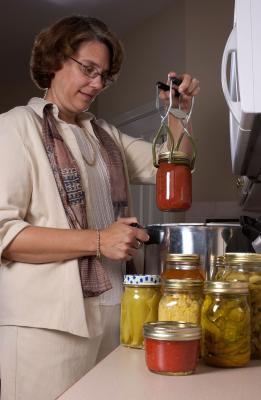 Extension agents have a history of teaching food preservation classes to their communities. During World War I when housewives were encouraged to plant “victory gardens,” and then again during the depression in the 1930s, canning methods were taught through home demonstration classes and publications by the agents at land-grant colleges and universities.
Extension agents have a history of teaching food preservation classes to their communities. During World War I when housewives were encouraged to plant “victory gardens,” and then again during the depression in the 1930s, canning methods were taught through home demonstration classes and publications by the agents at land-grant colleges and universities.
Today is no different. When there was an upswing in interest in canning two years ago, Family and Consumer Sciences (FCS) agents responded with classes on food safety and preservation. Sandra Bastin, Associate Extension Professor and Foods & Nutrition Extension Specialist, began her “Food Preservation Boot Camp,” for drying, freezing, and canning fresh fruits, vegetables, and herbs. Hers is a 4-5 hour class with three participation stations: one for dried herbs, one for freezing jams and jellies, and one for canning in both a boiling water bath and a high pressure bath.
“The increased interest in food preservation isn’t just about the economy,” says Bastin. “It is also a result of the ‘Buy Local’ initiative, the popularity of Farmer’s Markets, and people remembering how their parents and grandparents canned all their beautiful produce. It’s a combination of going green, history, and the economy.”
FCS Agent Deborah Sheperd holds a Food Preservation Boot Camp for Casey County. The class includes not just the how-to of canning, drying and freezing, but also knife skills and basic food safety tips pertaining to food preservation, all in a hands-on learning environment.
“This year there seems to be an increase in the number of people wanting to can for the first time or for the first time in many years,” said Marsha Parker, FCS Extension Agent for Christian County. “The canning/freezing workshops give them the opportunity to learn to do so in the correct way - using pressure canners for most vegetables, adding lemon juice to tomatoes, using a water bath for jams and jellies, etc. By using a pressure canner with someone giving instructions and demonstrating how, a first time canner gains the courage to use one on his or her own."
Kathy R. Byrnes, Kenton County FCS Extension Agent, teaches an all-day class, the “Food Preservation Clinic.” Taught in conjunction with Diane Mason of Boone County, the hands-on workshop teaches participants how to dry and freeze food as well as canning, and includes all materials, plus the food. Last year they had 45 people attend three classes, a record for both of their communities.
Annie Kingston has taught food preservation classes in McCracken, Fulton, Caldwell, Christian, Todd, and Livingston Counties this year, and sees increased interest in not just canning but gardening as well. “Most people who were in my classes wanted to see a pressure canner in action,” Kingston said. “Many people grew up with a fear of canners rather than just the healthy respect they deserve. Others needed updates on food safety and questioned why we cannot do things the way grandma did.” In addition to the pressure canner and hot water bath, she also taught about jams, jellies, and food dehydrators.
FCS agents are conducting food safety and preservation classes in various counties throughout the state, teaching the methods mentioned above and offering specific recipes and other tips. To learn about programs in your area, go to http://www.ca.uky.edu/county/ and look for your county Extension office contact information. Family and Consumer Sciences (FCS) Extension improves the quality of individual and family life through education, research, and outreach. Professionals in Family and Consumer Sciences Extension enable individuals and families to develop capacity for strengthening families and building community for an ever-changing society. For more information on FCS services, visit fcs-hes.ca.uky.edu .
